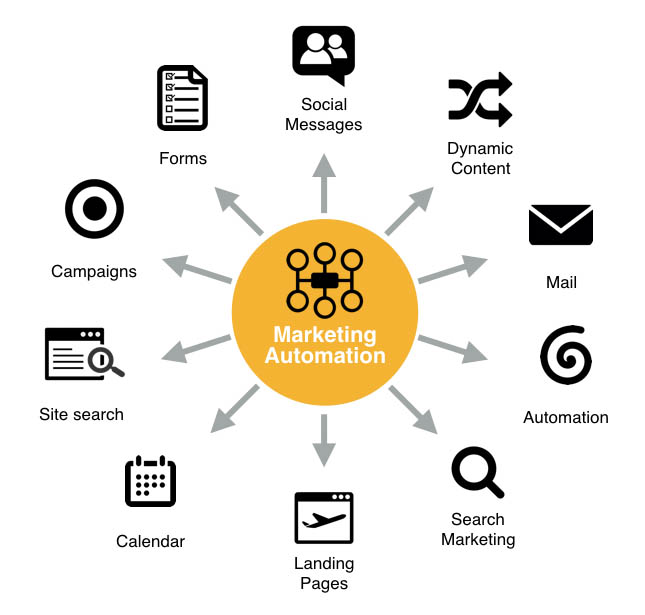Introduction:
In today’s fast-paced digital landscape, businesses are constantly seeking ways to streamline their operations and enhance their marketing strategies. One such solution that has gained significant traction is marketing automation. From small startups to large enterprises, marketing automation has become a cornerstone in driving growth and maximizing efficiency. In this blog, we’ll delve into the myriad benefits that marketing automation brings to businesses of all sizes.

Understanding Marketing Automation:
Marketing automation is a process that utilizes software and technology to streamline, automate, and measure marketing tasks and workflows, allowing businesses to more effectively target, engage, and nurture leads or customers across multiple channels. It involves the use of tools like email marketing platforms, customer relationship management (CRM) systems, and social media management tools to automate repetitive tasks such as email campaigns, social media posting, lead scoring, and segmentation. By automating these tasks, businesses can save time, improve efficiency, deliver personalized experiences to their audience, and ultimately drive better results and ROI from their marketing efforts.

Enhanced Lead Generation:
Enhanced lead generation involves the strategic use of various digital marketing tactics and data-driven techniques to attract, capture, and qualify leads more effectively. It encompasses leveraging advanced targeting methods, such as behavioral targeting and lookalike audience modeling, to reach potential customers who are most likely to be interested in a company’s products or services. Additionally, it involves optimizing landing pages and forms for conversion, utilizing compelling content offers and lead magnets to entice prospects to provide their contact information, and implementing lead scoring mechanisms to prioritize and qualify leads based on their level of engagement and fit with the ideal customer profile. By employing these tactics and continuously refining the lead generation process based on data insights, businesses can generate higher quality leads, increase conversion rates, and ultimately drive growth and revenue.
Improved Customer Engagement:
Improved customer engagement within marketing automation for businesses involves leveraging automated workflows and personalized communication strategies to foster meaningful interactions with customers across various touchpoints. By utilizing data analytics and segmentation techniques, businesses can tailor their marketing messages to match the preferences, behaviors, and needs of individual customers, enhancing relevance and resonance. Furthermore, automated email campaigns, social media interactions, and targeted content delivery can be deployed to nurture relationships over time, providing valuable information, support, and incentives to encourage ongoing engagement and loyalty. Through these efforts, businesses can build stronger connections with their audience, drive customer satisfaction and retention, and ultimately, achieve better business outcomes.
Increased Efficiency and Productivity:
Increased efficiency and productivity in marketing automation for businesses is achieved through the implementation of streamlined processes and automated workflows, reducing manual labor and repetitive tasks. By utilizing automation software, businesses can schedule and execute marketing campaigns across multiple channels, such as email, social media, and digital advertising, without the need for constant manual intervention. Additionally, features like lead scoring and segmentation allow for targeted communication, ensuring that resources are allocated effectively to engage with prospects most likely to convert. Moreover, automated reporting and analytics provide valuable insights into campaign performance, enabling swift adjustments and optimizations to maximize ROI. Overall, marketing automation empowers businesses to accomplish more with fewer resources, freeing up time and energy to focus on strategic initiatives and driving business growth.
Better ROI and Revenue Growth:
Illustrate how marketing automation contributes to a higher return on investment (ROI) by optimizing marketing efforts and driving more qualified leads. Discuss case studies or examples of businesses that have experienced significant revenue growth through the implementation of marketing automation.

Seamless Integration with Other Tools:
Seamless integration with other tools in marketing automation for businesses involves the cohesive connection between various software platforms and systems to create a unified ecosystem. This integration enables smooth data flow and communication between different tools such as CRM systems, email marketing platforms, analytics tools, and customer support software. By seamlessly linking these tools, businesses can synchronize customer data, automate workflows across different departments, and ensure consistent messaging and experiences for customers across all touchpoints. Additionally, integrating marketing automation with other business tools allows for more robust data analysis, advanced segmentation, and personalized communication, ultimately enhancing efficiency, effectiveness, and overall business performance.
Scalability for Growth:
Scalability for growth in marketing automation for businesses refers to the ability of the automation system to accommodate increasing demands, complexity, and volume as a company expands. It involves deploying flexible software solutions and infrastructure that can easily adapt to evolving business needs, such as a growing customer base, expanding product lines, or entering new markets. Scalable marketing automation platforms offer features like customizable workflows, API integrations, and cloud-based architecture, allowing businesses to seamlessly scale their marketing efforts without disruption. By leveraging scalable automation tools, businesses can efficiently manage larger datasets, handle higher campaign volumes, and maintain consistent performance as they grow, ensuring that their marketing operations remain agile and responsive to changes in the market environment.

Data-Driven Decision Making:
Emphasize the role of data analytics in marketing automation and how it enables businesses to make informed decisions based on real-time insights. Discuss the importance of tracking and analyzing key performance metrics to continually optimize marketing campaigns.
Enhanced Customer Experience:
Explore how marketing automation contributes to a seamless and personalized customer experience across multiple touchpoints. Discuss the significance of delivering relevant content and offers based on customer behavior and preferences.
Competitive Advantage:
Highlight how businesses that leverage marketing automation gain a competitive edge by staying ahead of market trends and delivering more targeted and effective marketing campaigns. Discuss the importance of innovation and staying agile in today’s digital landscape.
Conclusion:
In conclusion, marketing automation offers a multitude of benefits for businesses looking to streamline their marketing efforts, drive growth, and enhance customer engagement. From lead generation to customer retention, the impact of marketing automation extends across every aspect of the customer journey. By investing in the right marketing automation tools and strategies, businesses can position themselves for long-term success in an increasingly competitive marketplace.

